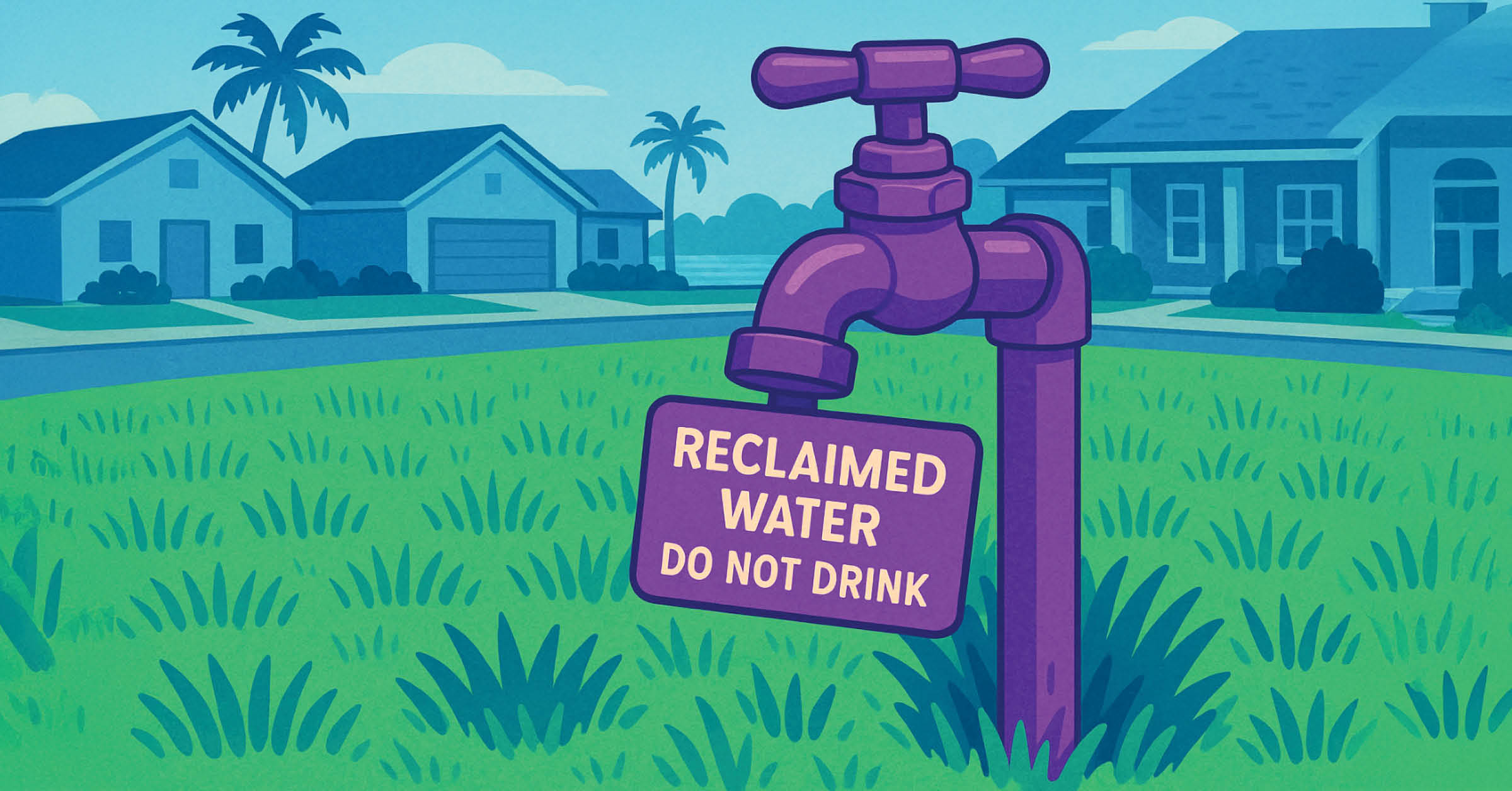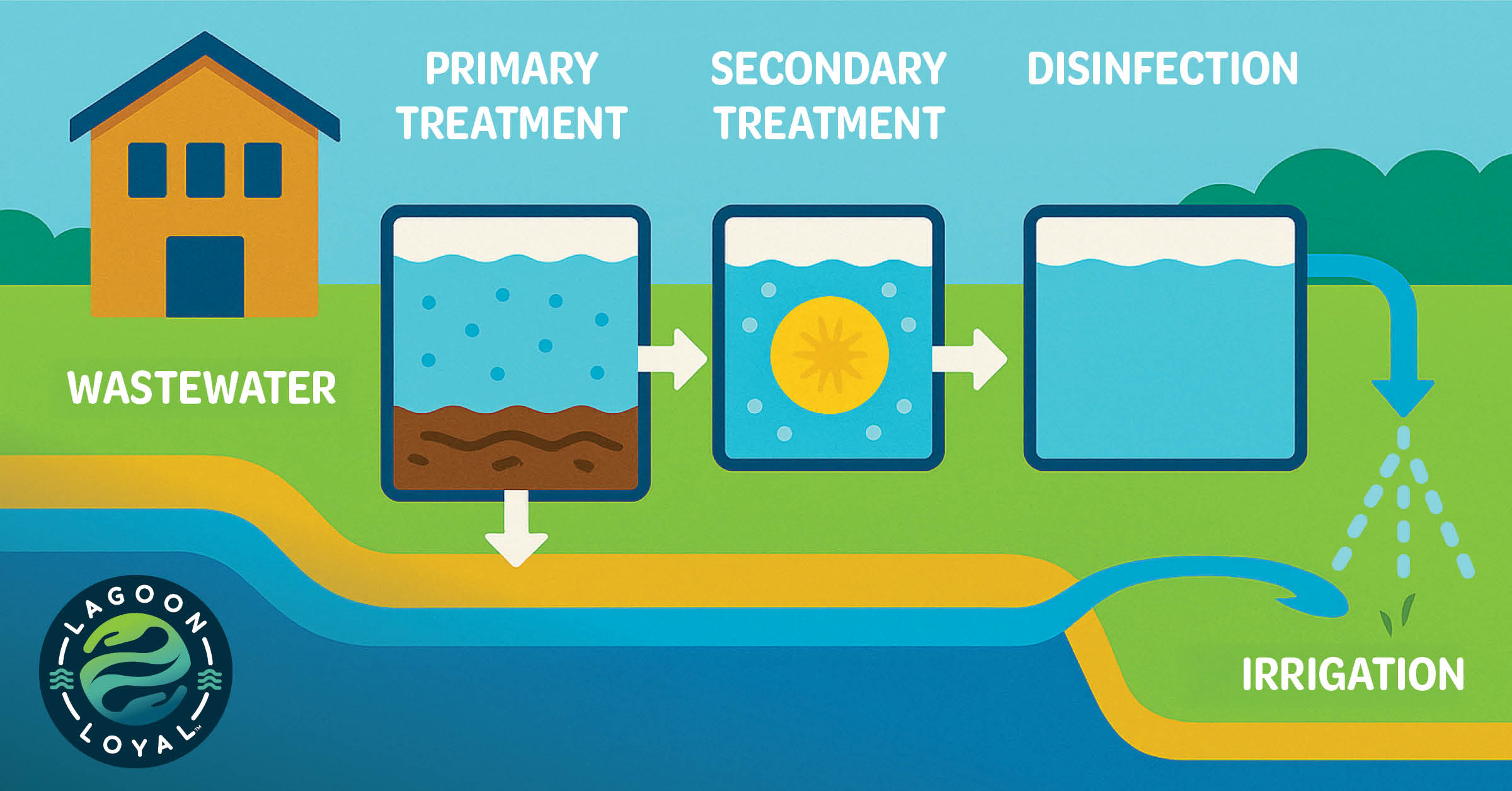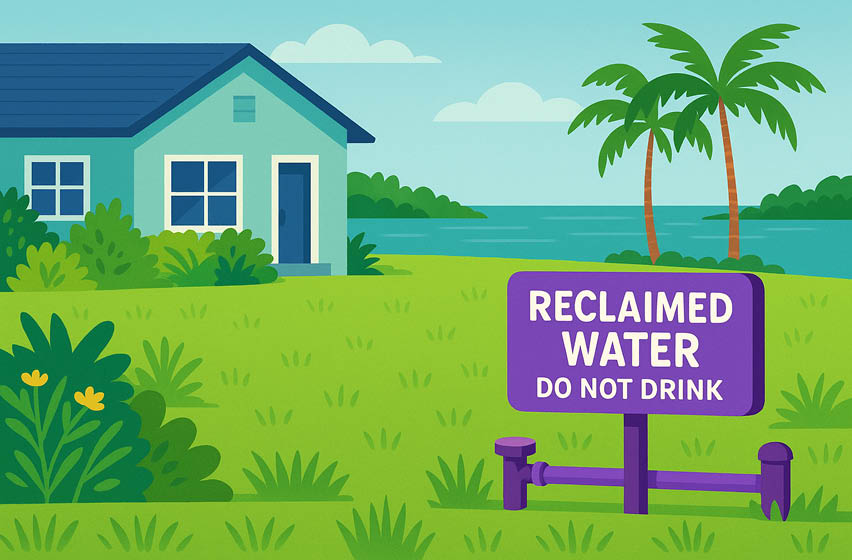Does Your Lawn Need Fertilizer? A Lagoon-Friendly Guide for Reclaimed Water Users
How to Care for Your Lawn and Protect the Lagoon if You Use Reclaimed Water
You might not realize it, but if your yard is watered with reclaimed water, it could already be getting all the nutrients it needs—and then some. Before you grab that fertilizer bag or run your sprinklers, let’s break down what reclaimed water is, how it works, and why watering wisely is one of the best things you can do to help protect the Indian River Lagoon.
What Is Reclaimed Water?
Reclaimed water is wastewater from homes and businesses that’s been cleaned at a wastewater treatment plant and reused for irrigation. Many Brevard County neighborhoods receive reclaimed water through purple pipes and labeled fixtures so that residents know it’s safe for lawns but not for drinking.
Using reclaimed water helps conserve drinking water; however, it also contains nitrogen and phosphorus—nutrients that fertilize your lawn.

How Is Reclaimed Water Treated?
Before reclaimed water reaches your lawn, it goes through several steps:
- Primary treatment removes solids.
- Secondary treatment breaks down organic matter.
- Disinfection kills bacteria, usually with chlorine.
- Tertiary treatment (sometimes) further filters water and reduces nutrients.
Even after this process, reclaimed water retains excess nutrients such as nitrogen and phosphorus—which can contribute to nutrient pollution in the Indian River Lagoon if not managed carefully.

Why It Matters for the Lagoon
If you irrigate with reclaimed water and fertilize too, you may be applying far more nitrogen than your lawn can use. Florida’s sandy soils don’t retain those nutrients, so they easily wash away into storm drains or leach into groundwater—eventually flowing into the Indian River Lagoon.
That nutrient overload fuels harmful algal blooms, blocks sunlight, smothers seagrass, and harms fish and wildlife. What happens in your yard can directly affect the lagoon.
If you’re not sure how much water your irrigation system is applying, try the Tuna Can Test—a simple, no-cost way to measure your sprinkler’s output.
How Can You Tell If You’re Using Reclaimed Water?
If you’re unsure whether your system uses reclaimed water, check for:
- Purple pipes, valves, or spigots
- Labels saying “Reclaimed Water – Do Not Drink”
- Ask your HOA, utility provider, or call the Brevard Reuse Hotline at 321-733-5634. This line will be updated regularly with the status and availability of reclaimed water in your area. You will be prompted to press the appropriate number for your particular area:
- Press 1 for the Mims Area
- Press 2 for Merritt Island and Port St. John Areas
- Press 3 for the Suntree and Viera Areas
- Press 4 for the Beach Areas
What Should Reclaimed Water Users Do?
If your home is connected to reclaimed water:
🌿 Skip fertilizer altogether.
Your reclaimed water likely provides all the fertilizing nutrients your lawn needs.
🌧️ Turn off your sprinklers during Florida’s rainy season (June–September).
Most lawns don’t need supplemental water during this time. Learn more in our Lagoon-Friendly Rainy Season Irrigation guide.
🕑 Follow St. Johns River Water Management District watering restrictions, even for reclaimed water:
- No watering between 10 a.m. and 4 p.m.
- No more than 1 hour per zone on approved watering days
- Learn more here.
📏 Test your sprinkler system output using the Tuna Can Test.
This simple test ensures you’re applying only the amount of water your yard can absorb.
🌡️ Install and maintain a rain sensor—it’s required by Florida law!
See our Rain Sensor Guide for tips on choosing, installing, and checking your device.

How This Fits Into Your Lagoon-Friendly Routine
Reclaimed water users should combine smart watering habits with helpful tools like rain sensors, rain gauges, and irrigation system checks. If you’re irrigating with reclaimed water, remember that:
✅ Fertilizer is usually unnecessary
✅ Your system still needs to comply with seasonal restrictions
✅ Rainy season means your lawn may not need irrigation at all
✅ Devices like rain sensors help you comply with Florida law and protect the lagoon. Read the Rain Sensor Guide
Why This Matters in Brevard County
The Indian River Lagoon is home to thousands of plant and animal species, including manatees, sea turtles, and numerous fish and bird species. But excess nitrogen and phosphorus from residential lawns fuel algae blooms that harm this fragile ecosystem.
By making simple, lagoon-friendly choices—like skipping fertilizer if you use reclaimed water, turning off irrigation during rainy months, and keeping your system efficient—you help protect one of Florida’s most important natural resources.
Take the Lagoon Loyal Pledge
🙌 Take the Lagoon Loyal fertilizer pledge today!
Pledge to skip fertilizer, water wisely, and help keep our lagoon clean.
Summary Checklist
- Skip fertilizer
Reclaimed water already contains nutrients. - Turn off irrigation during rainy season
Avoid waste and reduce runoff. - Follow watering restrictions
Conserve water and protect water quality. See details - Test your system with the Tuna Can Test
Ensure you’re applying the right amount of water. - Install a rain sensor
Stay compliant and reduce runoff. Rain Sensor Guide
💡 Pro tip:
Water smarter—not more. Every drop you save and every ounce of nutrient runoff you prevent helps protect the lagoon.
References
- Brevard County Utility Services. (2024). Reclaimed Water Program. https://www.brevardfl.gov/UtilityServices/ReclaimedWater
- St. Johns River Water Management District. (2024). Watering Restrictions. https://www.sjrwmd.com/wateringrestrictions/
- UF/IFAS Extension. (2020). Residential Irrigation System Rainfall Shutoff Devices. https://edis.ifas.ufl.edu/publication/AE221
- UF/IFAS Extension. (2023). Reclaimed Water: Frequently Asked Questions. https://blogs.ifas.ufl.edu/extension/2017/06/20/reclaimed-water-frequently-asked-questions/
- U.S. Environmental Protection Agency WaterSense. (2023). Outdoor Water Use in the United States. https://www.epa.gov/watersense/outdoor
- Florida Statutes § 373.62. (2023). Rain sensor devices required for automatic sprinkler systems. http://www.leg.state.fl.us/statutes/index.cfm?App_mode=Display_Statute&URL=0300-0399/0373/Sections/0373.62.html















